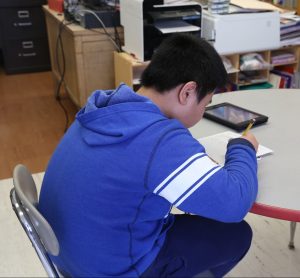hacker literacies
Google Translate bot, what are your politics?
On 21, Aug 2016 | No Comments | In reflections from the field | By Sara Vogel, PhD.
Last school year, my incredible colleague at Brooklyn College, Laura Ascenzi-Moreno and I followed a 6th grade newcomer student from China and his teachers, paying attention to how they integrated Google Translate (as a translanguaging practice) into their practices to communicate with each other and learn. In multilingual classrooms, Google Translate has become such a ubiquitous tool — used not just to make sure homework assignments and notes are read by parents but in ways that, as we found, actually contribute to the relationships between teachers, students, and knowledge.

I don’t want to fetishize the role of this software — of course dynamics at schools are influenced by a myriad of interacting factors, and there were many ways that communication and expression were negotiated in this classroom. But the students’ participation as a community member, his teachers’ access to his thinking, and their conception of the students’ voice as a writer — this software was playing a role in shaping all that. Our chapter on that stuff will come out eventually and you’ll be able to read what we say.
But I’ve been thinking a lot about my dear friend Rafi Santos‘ work on Hacker Literacies — that ideologies are not just behind the media messages we consume, but are actually baked in to technologies and “sociotechnical spaces” (my favorite Rafi phrase). The code and algorithms of technologies, software, and tools, no matter how neutral they may appear, offer fair game for critique — someone made them with an intention so they are discourse (right? I’ll be taking a class on power and knowledge this semester, so I’ll get back to you on that…)
I believe in the power of educators as activists. For this, I think teachers have to be empowered in relationship to the medium AND the message.
With that in mind, I offer some approaches we bilingual educators might take:
- Sort out our feelings about machine translation. There’s not a lot of research out there on machine translation as it’s used in K-12 education. But from what I’ve read regarding its applications in higher ed foreign language departments and the field of translation, many are anxious about plagiarism and copying, people’s jobs becoming obsolete, students relying too much on computers and less on their brains, poor/garbled/artless translation. It’s worth figuring out which of these are founded and which we care about.
- Know how it works. It’s complex stuff, but just knowing the basics can help us make our claims. This piece on Medium breaks down the inner workings of machine translation software, and then, there’s this video from Google itself.
- Consider machine translation in relation to our politics and theories in bilingual education. To what extent are machine translation algorithms built with the dynamic ways people use language and translanguage, in mind? Who designs the algorithms and selects the data corpus to “feed” the machines? What human-translated texts are being “fed” into the machine? To what extent might those texts reinforce static notions of language? To what extent do they reflect colonial relationships and raciolinguistic ideologies? How might machine translation promote translanguaging and dynamic language use in our classrooms?
- Bring critical and technical conversations about machine learning, together. My classmate Achim Koh from the GC is working on a project to help academics from a variety of fields understand how machine learning is shaping their disciplines. Worth bringing people from bilingual education and linguistics in on the dialogue.
The politics of some machine learning systems — I’m thinking about you, racist Microsoft bot — have been damaging, reflecting historical systems of oppression and domination. There’s a lot at stake here. Machine translation has proven itself to be indispensable to multilingual classrooms in the 21st century. If we and our students are using these tools, we need to think critically about them. They might be potential instruments of a more linguistically fluid world, reinforce linguistic hierarchies, or more likely, have some complex role to play in the middle. Already, my adviser’s favorite metaphor for language separation (the language button on the iPhone) is breaking down with this announcement about Siri’s new translanguaging capabilities.
The machines learn from humans — humans train them. Which means our ideologies are key.



